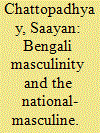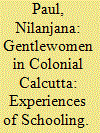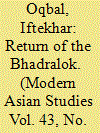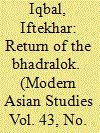|
|
|
Sort Order |
|
|
|
Items / Page
|
|
|
|
|
|
|
| Srl | Item |
| 1 |
ID:
107960


|
|
|
|
|
| Publication |
2011.
|
| Summary/Abstract |
This article examines how Bengali masculinity has been negotiated between national and ethnic/local notions of identity and suggests a new way of understanding this issue. Within the specific historiography of Bengali masculinity, concerns regarding physical strength, courage and virility of the Bengali male have been central tropes, challenged by the colonially constructed stereotype of the effeminate Bengali. The present article maps mainly nineteenth century discourses regarding Bengali masculinity and focuses on one particular strategy of three, namely, construction of a mode of mythic-historical discourse to reclaim a supposedly more masculine past for Bengali men. This suggests the notion of national-masculine as a gendered materialisation of the compensatory agency of Bengali masculinity. Shown to occur through the articulation of buddhibal in contrast with bahubal that negotiates with the hegemonic national-masculine, this throws new light on the emerging prominence of the bhadralok concept of a sophisticated Bengali gentleman.
|
|
|
|
|
|
|
|
|
|
|
|
|
|
|
|
| 2 |
ID:
170177


|
|
|
|
|
| Summary/Abstract |
This article shows how two pioneering institutions for female education in colonial Bengal, Bethune and Sakhawat Memorial Girls’ Schools, made significant contributions to female education at a time when women’s education was mostly restricted to home teaching. The study brings out the underlying contradictions between traditional and modern approaches towards education displayed in the goals, admission process and curriculum structure of these two schools. Analysing their respective contributions demonstrates that Bethune and Sakhawat Memorial Girls’ schools produced the modern Bengali bhadramahila (well-educated woman) who secured higher education, but was also rooted in traditional values. The final section illustrates how with the expansion of education in the twentieth century, the boundaries of the reformist zeal gradually blurred, so that educated women in Bengal could fight for greater equality.
|
|
|
|
|
|
|
|
|
|
|
|
|
|
|
|
| 3 |
ID:
091386


|
|
|
|
|
| Publication |
2009.
|
| Summary/Abstract |
Since the late 1970s, historical studies of colonial Bengal have been dominated by the recurrent theme of the 'return of the peasant', generally set against the previously predominant notion that British-created landlords were omnipotent agents of agrarian relations. Although the new historiography restores agency to the peasant, it seeks to attribute the agrarian decline in the late colonial Eastern Bengal, roughly Bangladesh, to the 'rich peasant'. It is argued that the rich peasant wielded hegemonic authority on their poor fellow co-religionists by forging a 'communal bond', while exploiting them from within. Such development is often considered linked to the separatist idea that offered a 'peasant utopia' in the form of Pakistan against perceived Hindu domination. This article, while not altogether denying the role of the rich peasant, argues that the bhadralok, or the non-cultivating middle-class gentry, were far more powerful as a catalyst in agrarian relations in Eastern Bengal than is conceded in contemporary historical debates. In so arguing, this article re-examines the post-structuralist turn that appeared to replace the classical Marxist paradigm of class by that of culture and consciousness.
|
|
|
|
|
|
|
|
|
|
|
|
|
|
|
|
| 4 |
ID:
091661


|
|
|
|
|
| Summary/Abstract |
Since the late 1970s, historical studies of colonial Bengal have been dominated by the recurrent theme of the 'return of the peasant', generally set against the previously predominant notion that British-created landlords were omnipotent agents of agrarian relations. Although the new historiography restores agency to the peasant, it seeks to attribute the agrarian decline in the late colonial Eastern Bengal, roughly Bangladesh, to the 'rich peasant'. It is argued that the rich peasant wielded hegemonic authority on their poor fellow co-religionists by forging a 'communal bond', while exploiting them from within. Such development is often considered linked to the separatist idea that offered a 'peasant utopia' in the form of Pakistan against perceived Hindu domination. This article, while not altogether denying the role of the rich peasant, argues that the bhadralok, or the non-cultivating middle-class gentry, were far more powerful as a catalyst in agrarian relations in Eastern Bengal than is conceded in contemporary historical debates. In so arguing, this article re-examines the post-structuralist turn that appeared to replace the classical Marxist paradigm of class by that of culture and consciousness.
|
|
|
|
|
|
|
|
|
|
|
|
|
|
|
|
|
|
|
|
|